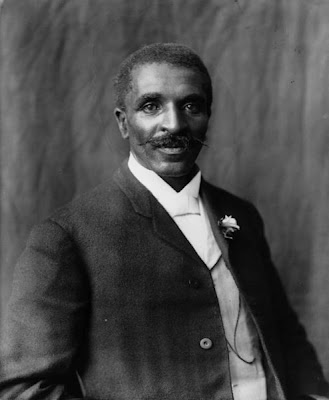 George Washington Carver was born in Missouri on the plantation of Moses Carver. His parents were slaves. His father died just before George was born, so when he was a baby, slave traders kidnapped him along with his mother. Only George was returns to the orchard.
George Washington Carver was born in Missouri on the plantation of Moses Carver. His parents were slaves. His father died just before George was born, so when he was a baby, slave traders kidnapped him along with his mother. Only George was returns to the orchard.
When I was a baby who had a disease called whooping cough *. She left him sick and unable to do the hard work, like the other slaves. Their duties were cooking and sewing. He loved gardening.
He learned to read. His family was very poor, could not afford to buy a pencil, so I made a pencil holder and was used only 1 / 4 "long.
I wanted to get an education. When he was 12 years old, left home to attend a black school. There was only one teacher with 75 children in a small room. While other children played on the break, he studied. He studied at home before and after they did their homework. Little did more than his teacher did.
He wrote for a university to enroll and is accepts, but when he learned he was black, he said they could not attend.
After five years, when he was 30 years old, was accepted at the University of Iowa, he knew his teacher helped him get a transfer * at Iowa State College, where he studied botany. She learned about plants and agriculture. It was the best student in botany at the campus.
He did many things to make money to pay expenses. He sold grain I had done, and sometimes ironing clothes for their classmates. There was a stove in the old city dump and brought it home to cook for his friends. I used old wrapping paper notebooks.
"Do not throw anything," he said. "Anything can be used again."
After graduation, he was asked to teach biology students * first. Later he was ask to teach at Tuskegee Institute in Alabama.
Carver began studying the illnesses that attack the crops of farmers. He also did a lot of experimenting to find new ways to use different plants. He made over 300 peanut products. He even soap and ink from peanuts. Sweet potatoes, made 118 products, including flour and candy. 75 products made from nuts and even made a building material for walls of cotton stalks. There were many good ideas!
Carver at work in his laboratory later in his life, Thomas Edison offered him $ 100,000 a year to come work for him, but he thought he could do more good in Tuskegee.
He made his students work hard; maintain that they do all the right experiment. If you had said something "about right", he said, "Do not tell me, is" about right. If it is "about right", then it is wrong. "
Money, stylish clothes, fine cars were not important to him. I thought it was successful person who had learned to serve others.
He was one of the greatest scientists the world has ever known.
0 comments:
Post a Comment